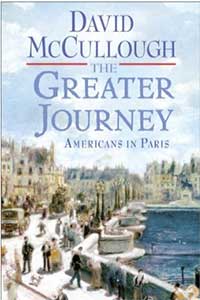 Historian and author David McCullough’s new book revisits the adventurous American artists, writers, doctors, politicians and architects who set off for Paris in the years between 1830 and 1900 to see what France could teach them. McCullough, who has been called a “master of the art of narrative history, is a two time winner of the Pulitzer Prize for “Truman” and “John Adams.”
Historian and author David McCullough’s new book revisits the adventurous American artists, writers, doctors, politicians and architects who set off for Paris in the years between 1830 and 1900 to see what France could teach them. McCullough, who has been called a “master of the art of narrative history, is a two time winner of the Pulitzer Prize for “Truman” and “John Adams.”
His book shows how American history was influenced by the experiences gained from Americans who had lived in Paris. After risking the hazardous journey across the Atlantic, these Americans embarked on what the author calls a greater journey in the City of Light. Writers Ralph Waldo Emerson, Nathaniel Hawthorne, Mark Twain, and Henry James were all influenced by living in France
As David McCullough writes, “Not all pioneers went west.” Elizabeth Blackwell, the first female doctor in America, was one of this intrepid band. Another was Charles Sumner, who enrolled at the Sorbonne because of a burning desire to know more about everything. There he saw black students with the same ambition he had, and when he returned home, he would become the most powerful, unyielding voice for abolition in the U.S. Senate, almost at the cost of his life.
Samuel F. B. Morse came to Paris for painting, but something he saw in France inspired his momentous idea for the telegraph. After a second visit to France Morse brought home Louis Daguerre’s idea on photography “The Daguerreotype.”
Medical student Oliver Wendell Holmes wrote home of his toil and the exhilaration in “being at the center of things” in what was then the medical capital of the world. From all they learned in Paris, Holmes and his fellow “medicals” were to exert lasting influence on the profession of medicine in the United States. McCullough tells these fascinating stories with power and intimacy, bringing us into the lives of remarkable men and women who, in Saint-Gaudens’s phrase, longed “to soar into the blue.”

